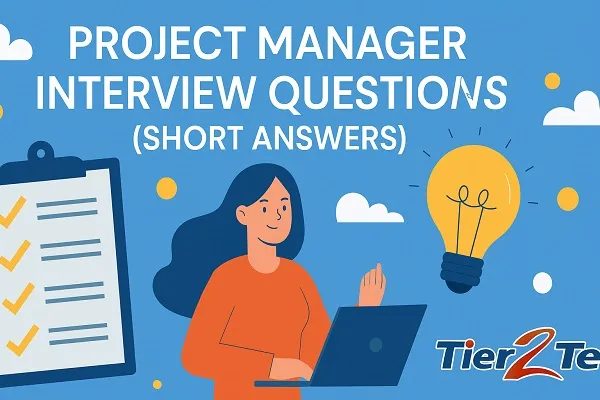Project Manager Interview Questions with Answers

Preparing for a project management interview can feel overwhelming, especially with the variety of methodologies, tools, and team dynamics involved. To help you succeed, we’ve compiled a list of common project manager interview questions with concise, effective answers. These will help you showcase your leadership, problem-solving, and organizational skills confidently and clearly.
1. What is the role of a project manager?
Answer: A project manager is responsible for planning, executing, and closing projects—ensuring they are completed on time, within budget, and aligned with business goals.
2. How do you prioritize tasks in a project?
Answer: I use prioritization techniques like MoSCoW or Eisenhower Matrix, considering urgency, impact, and resource availability to allocate time and focus effectively.
3. What is the difference between Agile and Waterfall methodologies?
Answer: Waterfall is a linear, sequential approach, while Agile is iterative, allowing for flexibility and continuous feedback throughout the project.
4. How do you handle scope creep?
Answer: I manage scope creep by ensuring clear documentation, setting expectations early, and requiring formal change requests for any adjustments to scope.
5. What tools do you use to manage projects?
Answer: I commonly use tools like Jira, Trello, Asana, or Microsoft Project to plan tasks, track progress, and collaborate with teams.
6. Describe a challenging project and how you handled it.
Answer: On a delayed software rollout, I conducted a risk reassessment, reallocated resources, improved communication with stakeholders, and brought the project back on track within two weeks.
7. How do you manage project risks?
Answer: I identify risks early, assess their likelihood and impact, and create mitigation and contingency plans to minimize disruption.
8. How do you motivate a team?
Answer: I focus on clear goals, regular feedback, recognizing achievements, and fostering open communication to keep morale high.
9. What’s your approach to stakeholder management?
Answer: I identify key stakeholders early, maintain regular updates, manage expectations, and ensure their feedback is considered throughout the project.
10. How do you track project progress?
Answer: I use KPIs, Gantt charts, burndown charts, and regular standups or check-ins to ensure the project is moving as planned.
11. What would you do if a project was falling behind schedule?
Answer: I would analyze root causes, reallocate resources if possible, and communicate transparently with stakeholders to adjust timelines or scope as needed.
12. How do you deal with conflict in your team?
Answer: I address conflict directly and calmly, listening to all parties, facilitating a resolution, and ensuring alignment on project goals.
13. Can you explain the project life cycle?
Answer: It includes initiation, planning, execution, monitoring & controlling, and closing phases—each critical to a successful project outcome.
14. How do you ensure quality in your projects?
Answer: I define quality standards early, include regular testing/reviews, and involve QA or peer assessments to ensure deliverables meet expectations.
15. How do you manage budgets for a project?
Answer: I create a detailed budget plan, monitor expenses regularly, compare against forecasts, and make adjustments to avoid overruns.
🔍 Essential Acronyms to Know for a Project Manager Interview
Knowing these common acronyms can give you an edge in your project management interview:
ROI – Return on Investment
A metric used to evaluate the financial return or benefit from a project relative to its cost.
PMBOK – Project Management Body of Knowledge
A standard framework from PMI outlining best practices and guidelines in project management.
WBS – Work Breakdown Structure
A hierarchical decomposition of a project into manageable tasks or deliverables.
RACI – Responsible, Accountable, Consulted, Informed
A responsibility assignment matrix used to clarify roles in a project.
KPI – Key Performance Indicator
Metrics used to measure the success or progress of a project or task.
SOW – Statement of Work
A document that outlines project scope, deliverables, timeline, and expectations.
PMP – Project Management Professional
A globally recognized certification offered by PMI for project managers.
CPM – Critical Path Method
A technique used to identify essential tasks that determine the shortest project timeline.
Agile – Not an acronym, but a methodology
An iterative project approach that emphasizes collaboration, customer feedback, and adaptability.
SCRUM – Not an acronym, but a framework within Agile
A set of roles, events, and artifacts used in Agile to manage complex projects.
